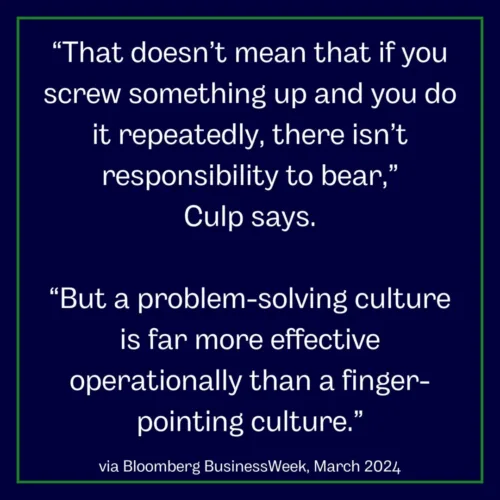There was a fascinating article in Bloomberg BusinessWeek about GE doing its final spinoff of GE Vernova (ticker symbol: GEV) and the remaining business that Larry Culp remains CEO of, GE Aerospace (formerly GE Aviation, ticker symbol: GE).
AN EMPIRE DIVIDED
The inside story of how GE CEO Larry Culp dismantled a 131-year-old American giant.
One part of the article caught my eye because of my focus on prioritizing problem-solving and improvement over blame and punishment (via my podcast about mistakes, my latest book about learning from mistakes, and a new project TBD).
The article compared the current-state GE Aerospace with the GE of old, under Jack Welch (and it's been almost 23 years since he retired as CEO)…
For context, the article was talking about Lean process improvement and breaking down barriers to flow and then said:
“That process isn't “perfect,” even if it has improved, says Kayla Ciotti, materials and planning leader at GE Aerospace. “Ten years ago, we had brick walls. Five years ago, we had screen doors,” she says. “The door is open now. There's no door.”
In contrast with the cutthroat culture at Welch's GE, Culp's employees will get some leeway if they do walk into walls.”
Culp said something wonderful here:

I'll repeat that… “a problem-solving culture is far more effective operationally than a finger-pointing culture.”
I agree 100%, and I'm happy to see a CEO of Culp's stature say this.
Hear Mark read this post — subscribe to Lean Blog Audio
The article did not elaborate on this, but it shows the cultural transformation that has continued under Culp's leadership over the past five years. He's the first outsider to be hired to be the CEO of GE in the company's long history.
As I share in my book (that Culp recommended to employees after reading it last summer) and talk about in speaking engagement and training or coaching sessions, leaders have a CHOICE about how they react to mistakes and problems.
As I blogged about in late 2022, Culp told a crowd at the AME Annual Conference that he told everybody at GE that he wanted to hear bad news, and he wanted to hear it fast.
As Culp said, what mattered was “the moment of truth”–how did he and other leaders react to the bad news?
Here's a short video clip of him in conversation with Katie Anderson:
These are my words, not his, but I break it down like this…
If a leader reacts to a mistake or bad news with blame and punishment, then employees learn to hide bad news when they can. That's not good for the company, as problems only get worse. And a company can't solve a problem that it doesn't know about.
If a leader reacts to a mistake with the mindset of understanding, problem-solving, and improving… we'll have fewer repeated mistakes and fewer problems… and small problems won't turn into huge catastrophes. The organization will perform better.
Punishing employees for mistakes, problems, or failures might feel good… but it's counterproductive.
Toyota talks about learning from mistakes instead of repeating them:
What do you think? What stories could you share?
Here's a story I heard at a conference last year:
Please scroll down (or click) to post a comment. Connect with me on LinkedIn.
Let’s work together to build a culture of continuous improvement and psychological safety. If you're a leader looking to create lasting change—not just projects—I help organizations:
- Engage people at all levels in sustainable improvement
- Shift from fear of mistakes to learning from them
- Apply Lean thinking in practical, people-centered ways
Interested in coaching or a keynote talk? Let’s start a conversation.










[…] . Los líderes y los empleados a menudo retroceden cuando oyen hablar de un entorno «libre de culpa». ¿No significa eso que estamos fomentando los errores y eliminando la responsabilidad? Larry Culp, Director General de GE, aclara que sustituir la cultura de señalar con el dedo por una … […]
This is good, Mark. Thanks for sharing.
Thanks for reading it!